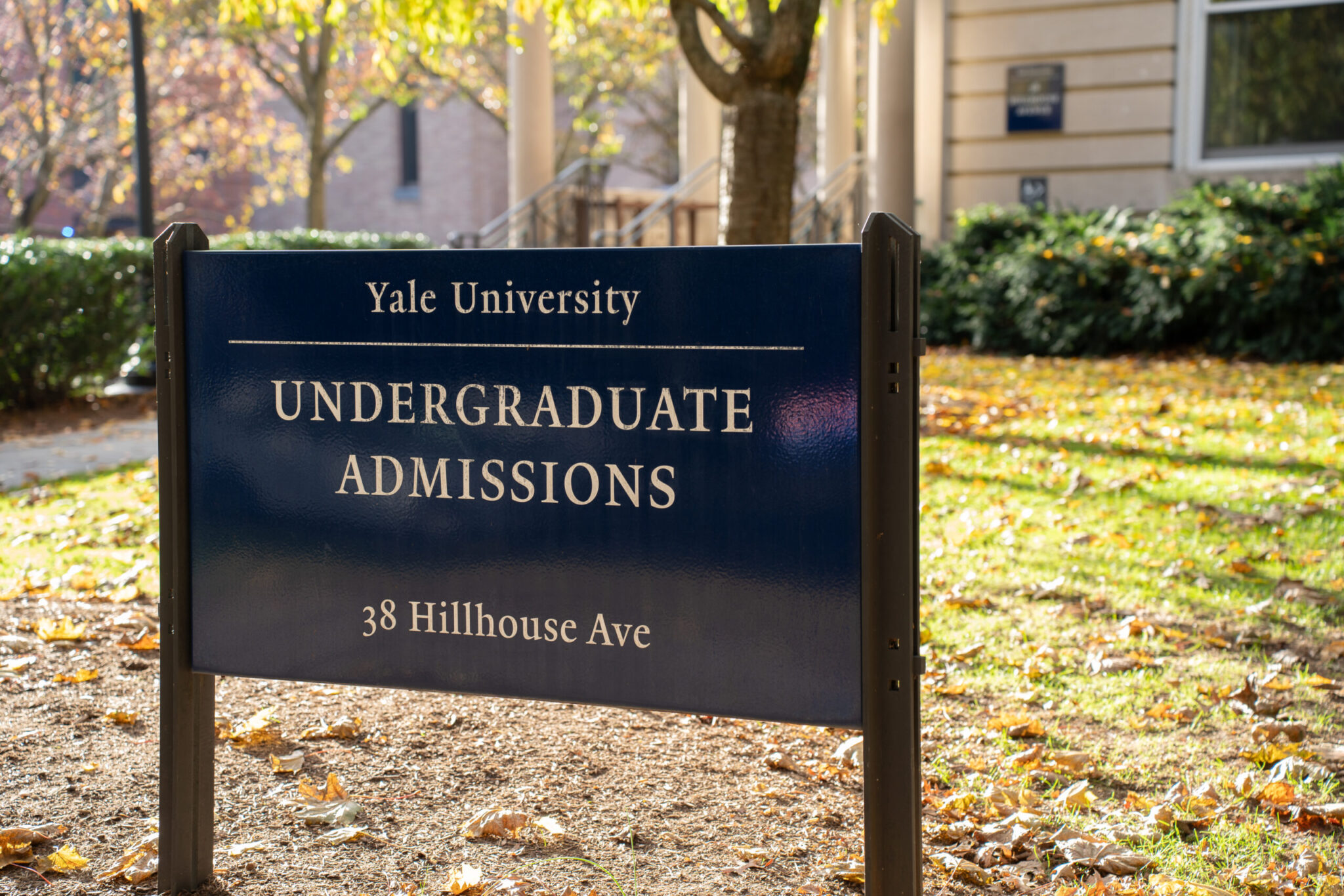Yale reinstates standardized testing requirement, allows AP and IB scores
In addition to SAT and ACT scores, students will be able to submit Advanced Placement and International Baccalaureate scores to fulfill Yale College’s new “test-flexible” policy beginning with applicants to the class of 2029.

Ellie Park, Photography Editor
After four years with a test-optional policy — which allowed students to decide whether or not to submit standardized test scores as part of their Yale College applications — the College will resume requiring test scores for the next application cycle. But now, in addition to SAT and ACT scores, Yale will allow students to submit Advanced Placement, or AP, and International Baccalaureate, or IB, scores to fulfill the standardized testing requirement. According to a Thursday message from the admissions office to high school counselors, applicants will be able to select one or more type of test from a list of four options — SAT, ACT, AP and IB — and those who select AP or IB will be required to include results from all subject exams that they have taken.
“Our experience with both test-optional and test-required policies has persuaded us of three things,” the University wrote in a statement posted on the admissions office website. “First, when used thoughtfully as part of a whole-person review process, tests can help increase rather than decrease diversity in our class. Second, a narrow focus on only the ACT and SAT can discourage promising students from considering colleges like Yale. Finally, inviting students to apply without any test scores can, inadvertently, disadvantage students from low-income, first-generation, and rural backgrounds.”
The University is the second Ivy League school to announce its long-term testing policy, after Dartmouth decided to resume a test-required policy earlier this month. Unlike Yale, however, Dartmouth will not accept AP and IB scores to fulfill the testing requirement.
In the statement, the admissions office said that the four years of test-optional applications afforded it the ability to re-evaluate the role that test scores play in its deliberation process. New research by organizations like Opportunity Insights about the predictive ability of standardized test scores helped inform the admissions office’s decision, the website says.
Among Opportunity Insights’ findings are that students with higher SAT and ACT scores are more likely to have higher college GPAs than their lower-scoring counterparts, and that high school GPAs alone are poor predictors of college success.
The office maintained that, despite accepting more types of scores, it does not prefer one score type over another, and students who submit more scores will not be advantaged.
Yale urged applicants against taking more tests to increase the number of scores that they include in their application. A narrow focus on testing is “not a wise college preparation strategy,” according to the Thursday release.
Going forward, the Yale-specific questions on all accepted application forums — the Common Application, the Coalition Application and the QuestBridge application — will contain a space for students to report scores that they would like considered with their Yale applications.
In a different optional question, students will have space to explain any of the circumstances surrounding their testing experience.
The role of tests in admissions
Under Yale’s holistic review framework, standardized test scores can help contextualize other parts of an application, like high school GPA, according to the admissions office.
“No exam can demonstrate every student’s college readiness or perfectly predict future performance,” Thursday’s statement reads. “Tests can highlight an applicant’s areas of academic strength, reinforce high school grades, fill in gaps in a transcript stemming from extenuating circumstances, and—most importantly—identify students whose performance stands out in their high school context.”
When admissions officers evaluate applications that do not include test scores — as they have often had to do in the past four test-optional cycles — they are forced to put more weight on other parts of the application. But, according to the release, this process frequently disadvantaged less wealthy applicants.
In a survey conducted earlier this month, the News found that students who receive financial aid were less likely to have submitted scores with their Yale applications than their wealthier counterparts.
Since going test-optional, Yale has seen a disproportionate increase in applications from students who would be the first in their family to attend college and students from neighborhoods with below-median household incomes. Applications to the class of 2028 saw applications from first-generation students and low-income students increase 13 percent and 19 percent more than the overall applicant pool, respectively.
In conversations with the News, low-income students who omitted scores said that they did so out of worry that a score below Yale’s median would take away from other parts of their application, or immediately disqualify them from consideration.
But Bruce Sacerdote, a researcher at Opportunity Insights, previously told the News that lower-income students submit test scores “at too low a rate,” according to his research.
“We hypothesize that this stems from applicants not having full knowledge of how test scores are used in context,” Sacerdote wrote to the News. “Scores are used as only one input and are viewed in the context of the applicant’s background, neighborhood and high school. As a result, applicants may not realize that their score is an impressive one that could help their admission chances.”
The new comments from the admissions office are in line with Sacerdote’s research, affirming that a score below Yale’s median can actually be useful in identifying applicants who stand out within their high school or personal environment.
Students from well-resourced high schools often have access to easy “substitutes” for standardized test scores, such as many advanced courses, comments from teachers with whom they have close relationships and hoards of impressive enrichment activities, per the statement.
Students from lower-resourced high schools, on the other hand, may have less access to advanced courses that showcase their academic ability, and more generic comments from teachers who deal with larger class sizes, the release says.
“With no test scores to supplement these components, applications from students attending [lower-resourced] schools may leave admissions officers with scant evidence of their readiness for Yale,” the release says. “When students attending these high schools include a score with their application – even a score below Yale’s median range — they give the committee greater confidence that they are likely to achieve academic success in college.”
Access barriers and goals moving forward
In addition to increased applications from first-generation and low-income students, since going test-optional in 2020, applications from international students increased by 130 percent, twice the rate of growth of domestic applicants, according to data from the admissions office.
Numerous international students spoke with the News about the barriers to access they faced when trying to take the SAT and ACT in their home countries. Many students said they had to travel long distances, often to other countries, to take the tests, a process that students felt favored wealthier applicants.
In a recent episode of the podcast “Inside the Yale Admissions Office” titled “How We Got Here,” hosts Mark Dunn ’07, senior associate director for outreach and recruitment at the Office of Undergraduate Admissions, and Hannah Mendlowitz ’12, associate director of admissions, said that it is “pretty easy” to understand why international applications increased when Yale adopted a test-optional policy.
“Registering for and taking the SAT or ACT abroad is much more challenging than it is in the US,” Mendlowitz said in the episode. “And understandably, many international students haven’t invested the same amount of time in preparing for or learning about those tests. So removing that barrier meant that a lot more international students could apply. And they did.”
As the admissions landscape has changed in the four years since most colleges went test-optional, Quinlan said he hopes adding AP and IB to the list of accepted scores will not disadvantage students who “have not had the ACT or SAT as part of their planning for college.”
Looking toward the future, Quinlan said that, while he is confident in the new test-flexible model, it is not set in stone.
“We are in a dynamic moment for standardized testing,” Quinlan told Yale News. “There are efforts to design and roll out new tests, and there is more energy for developing alternatives to the SAT or ACT than ever before. Although our research on the predictive power of the four tests we will accept next cycle is compelling, I like that our policy is flexible by design and can easily accommodate future additions to the list of required scores.”
Yale first announced a test-optional policy in June 2020.









